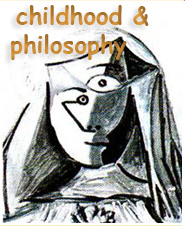starting out in philosophy: the “anguishes”
Keywords:
Clinique exploratoire, Philosophie, AngoisseAbstract
Doing philosophy in school poses two main problems: first, to determine what are the educational conditions in which children (but perhaps adult beginners also) can learn to exercise critical thinking; and secondly, to determine under which conditions the work can legitimately be called "philosophical." This study proposes a small contribution to solving the first of them. We chose to present a start-up situation in a regular school, to try to make it show some elements of the problem in circumstances accessible to everyone. We adopt an approach we call "exploratory clinical," based on what manifests by itself and does not imply anything about eventual results. We do a rigorous analysis of the transcription of the session that forms the study material. The generative event is the reading of an illustrated children’s book that resonates with children’s recurrently existential concern: anguish. Psychopathology had traditionally made a distinction between 1) fear, a sense of danger that is related to an identified cause, real and perceptible; 2) anxiety, a painful affection which refers to a possibility of uncertain cause; and 3) anguish, a feeling of helplessness which is accompanied by somatic phenomena. Fear indicates a real danger, and comes from the conservation reflexes (the fear of crossing a street due to heavy traffic, the fear of a menacing dog, etc.). Fear is easy to overcome, prudence and courage are sufficient. The two others states are more difficult to handle: how, indeed, to fight against what does not exist, or what can only exist in the future (that does not exist yet and may never exist)?Downloads
Download data is not yet available.
Downloads
Published
2012-02-08
Issue
Section
articles



